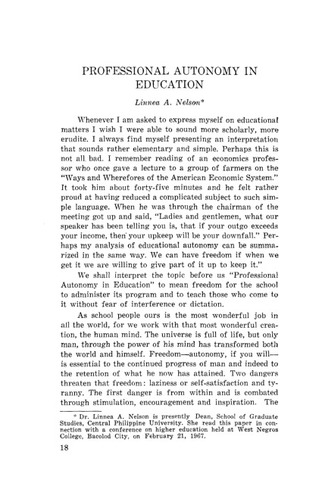Professional autonomy in education
Abstract
Whenever I am asked to express myself on educational matters I wish I were able to sound more scholarly, more erudite. I always find myself presenting an interpretation that sounds rather elementary and simple. Perhaps this is not all bad. I remember reading of an economics professor who once gave a lecture to a group of farmers on the “Ways and Wherefores of the American Economic System.” It took him about forty-five minutes and he felt rather proud at having reduced a complicated subject to such simple language. When he was through the chairman of the meeting got up and said, “Ladies and gentlemen, what our speaker has been telling you is, that if your outgo exceeds your income, then your upkeep will be your downfall.” Perhaps my analysis of educational autonomy can be summarized in the same way. We can have freedom if when we get it we are willing to give part of it up to keep it.”
We shall interpret the topic before us “Professional Autonomy in Education” to mean freedom for the school to administer its program and to teach those who come to it without fear of interference or dictation.
As school people ours is the most wonderful job in all the world, for we work with that most wonderful creation, the human mind. The universe is full of life, but only man, through the power of his mind has transformed both the world and himself.
Suggested Citation
Nelson, L. A. (1967). Professional autonomy in education.Type
ArticleSubject(s)
Collections
The following license files are associated with this item:


